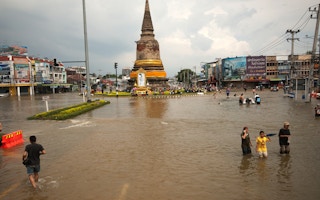On a blistering May afternoon, consultants hired by the Thai government unveil the next phase of a scheme aimed at preventing a repeat of Thailand’s 2011 floods, its worst in half a century. Yet the snazzy presentation fails to persuade local leaders and villagers from provinces west of the capital Bangkok.
They are unhappy with plans to dredge canals, as well as the focus on large infrastructure projects. What’s more, construction work that’s already finished was done without their knowledge or consent, they complain.
By the end of the four-hour session at the Nakhon Pathom office of the government’s irrigation department, which oversees water management in Thailand, the two dozen community representatives are frustrated and distrustful.
“If water overflows into farm land, what happens? If there’s damage, who will be responsible?” asks one community leader, voicing widespread scepticism in the room over the scheme’s effectiveness. Questions about flooding are on the mind of many as the monsoon season approaches.
Adding to the worry, Thailand’s political paralysis - following an army coup last month – has left in limbo a law that could help address water management problems exposed by the 2011 floods, such as the lack of a central agency to handle water resources.
Memories of those floods - which killed 800 people, affected nearly 14 million and disrupted global supply chains - loom large at the irrigation department meeting.
The floodwaters stayed for two months, local farmers lost most of their produce and the government provided minimal help, said Chutima Noinat of the Tha Chin People’s Council, a local civil society network named after a tributary of Bangkok’s Chao Phraya River.
“
As in many of Thailand’s riverside communities, people in the Tha Chin River Basin are fighting multiple battles – against a changing climate, rapid urbanisation, a shift from agriculture to industry, and policies from Bangkok that they say sideline the needs of ordinary citizens
Water law frozen
The integrated water law is now stuck with the Law Reform Commission of Thailand. Under the previous constitution, the final draft of the law could be proposed either to the government or parliament.
But those institutions were either swept away or are in disarray after the Thai army seized power on May 22, following nearly seven months of crippling anti-government protests. Both the House of Representatives and the Senate have been dissolved.
Chutima is concerned the water law’s inevitable delay will allow authorities to push ahead with their controversial flood management plan. Supporters of the water law argue it would allow better governance of water resources, because its drafting involved many public hearings and it proposes decentralisation of water management to the local level. It may also call into question some of the large infrastructure projects that are part of the flood control scheme.
Critics say the 350-billion baht ($11 billion) flood management plan, which includes building reservoirs and other infrastructure to control water, is expensive, prone to corruption and biased towards protecting high-value economic assets.
It was suspended in June 2013 by a Thai court, which ordered the government to hold more public hearings. Its backers have now said they intend to submit the plan to the junta.
Read the rest of the story at Trust.org.

















